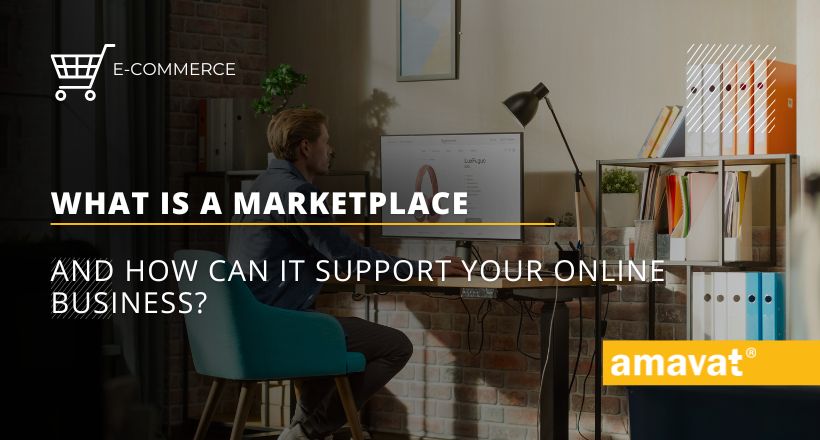What is a marketplace and how can it support your online business?
Online sales are becoming increasingly popular, and entrepreneurs are constantly searching for new ways to reach a broad audience of customers. In the e-commerce space, marketplaces play a key role by allowing businesses to start operations quickly and efficiently. Without the need to invest in building their own sales platform, sellers can take advantage of ready-made infrastructure, which provides access to millions of potential customers. So, what exactly is a marketplace, and why should you consider selling on such a platform?
Marketplace – How does it work?
A marketplace is an online sales platform that allows multiple sellers to showcase their products in one place. It can be compared to a traditional market, where various vendors offer their goods, and customers can choose and compare the offers. These platforms act as intermediaries, facilitating the sales process for both sellers and buyers.
The operation of a marketplace is based on creating a space where sellers can set up their stores or profiles and present their products. The platform handles transactions, payments, and provides tools for managing orders and logistics. Customers can easily browse through offers and compare prices from different sellers, helping them choose the best deal.
Key features of a marketplace
A marketplace stands out due to several features that make it an attractive sales model for businesses:
- Easy access to a broad customer base – Marketplace platforms attract large numbers of users, allowing sellers to reach new markets and increase their visibility.
- Ready-made sales infrastructure – Sellers don’t need to worry about building their own online stores, as the marketplace offers ready-to-use tools for managing sales, payments, and logistics.
- Customer trust – Large marketplaces like Amazon or Allegro enjoy high trust among buyers. Operating on such a platform gives sellers a better chance of gaining new customers thanks to the credibility of the platform itself.
Types of marketplace platforms
There are many different types of marketplace platforms in the e-commerce market, each differing in their specific focus and services offered. Here are some categories:
- General marketplaces – Platforms like Amazon, eBay, or Allegro offer a wide range of products across different categories, catering to both individual (B2C) and business (B2B) customers.
- Specialized marketplaces – These focus on specific industries. Examples include Etsy, which offers handmade and unique products, or Airbnb, which specializes in accommodation rentals.
- Local marketplaces – These focus on sales in a specific region or country, such as Allegro Locally or Facebook Marketplace, where listings target users in the same area.
Marketplace vs. online store – Main differences
While a marketplace and a traditional online store might seem like similar solutions, there are a few key differences that should be considered when choosing the right sales model.
- Technical and operational costs
- Competition and product pricing
- Brand building
Running your own online store requires building a website from scratch, which involves costs related to design, server maintenance, domain management, and payment processing. A marketplace offers ready-made solutions, eliminating many of these costs – the seller can start selling immediately without worrying about the technical aspects.
On marketplaces, multiple sellers may offer the same products, often leading to intense price competition. To stand out from the competition, sellers must offer attractive prices or other benefits, such as fast delivery. In the case of an online store, the business owner has more freedom in setting prices and building long-term customer relationships.
Running your own store offers more opportunities for building a brand and customer relationships. On marketplaces, sellers operate within the platform’s framework, which can make it harder to stand out. On the other hand, marketplaces benefit from customer trust, which can help in acquiring the first clients.
Why sell at marketplace?
For many entrepreneurs, especially those just starting out in e-commerce, a marketplace offers an excellent starting point. Here are a few reasons why you should consider selling on such a platform:
- Low entry barrier – Registering and starting sales on a marketplace is typically easier and cheaper than building your own online store. All you need is to create an account, add products, and start selling.
- Wide reach – Marketplaces have millions of users worldwide, giving sellers access to a vast base of potential customers.
- Technical support – Marketplace platforms provide ready-made technological solutions, eliminating the need to manage your own store, payment systems, or logistics.
- Trust and credibility – The biggest marketplaces, such as Amazon, Allegro, or eBay, have built their reputations over the years, which translates into greater customer trust in sellers operating on these platforms.
How to start selling on a marketplace?
Starting sales on a marketplace platform is relatively simple and involves a few steps:
- Choosing the platform – Identify the marketplace that best fits your industry and type of products.
- Registering as a seller – Complete the registration process and set up an account on your chosen platform.
- Creating a profile and store – Fill in your business details, add product descriptions, and upload photos.
- Managing logistics – Set up delivery methods and order management to ensure smooth customer service.
- Promoting products – Use the marketing tools offered by the platform to increase the visibility of your products.
Summary
A marketplace is a flexible and convenient sales channel that can significantly simplify running an e-commerce business. With ready infrastructure, broad reach, and technical support, marketplaces are an attractive option for both small entrepreneurs and large companies. Selling on such platforms allows businesses to quickly reach new customers without the need to invest in developing their own store.





